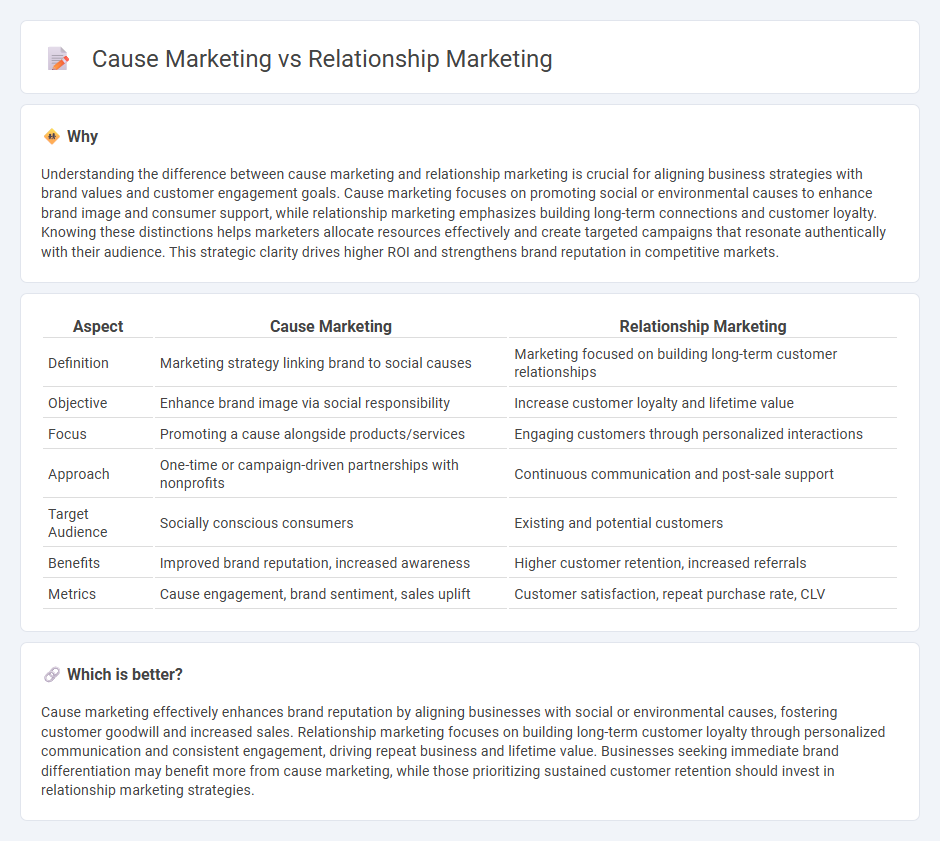
Cause marketing aligns brand values with social or environmental causes, enhancing corporate reputation and fostering customer loyalty through shared purpose. Relationship marketing focuses on building long-term consumer connections by delivering personalized experiences and consistent engagement to drive repeat business. Explore the distinctions and benefits of cause marketing versus relationship marketing to optimize your brand strategy.
Why it is important
Understanding the difference between cause marketing and relationship marketing is crucial for aligning business strategies with brand values and customer engagement goals. Cause marketing focuses on promoting social or environmental causes to enhance brand image and consumer support, while relationship marketing emphasizes building long-term connections and customer loyalty. Knowing these distinctions helps marketers allocate resources effectively and create targeted campaigns that resonate authentically with their audience. This strategic clarity drives higher ROI and strengthens brand reputation in competitive markets.
Comparison Table
| Aspect | Cause Marketing | Relationship Marketing |
|---|---|---|
| Definition | Marketing strategy linking brand to social causes | Marketing focused on building long-term customer relationships |
| Objective | Enhance brand image via social responsibility | Increase customer loyalty and lifetime value |
| Focus | Promoting a cause alongside products/services | Engaging customers through personalized interactions |
| Approach | One-time or campaign-driven partnerships with nonprofits | Continuous communication and post-sale support |
| Target Audience | Socially conscious consumers | Existing and potential customers |
| Benefits | Improved brand reputation, increased awareness | Higher customer retention, increased referrals |
| Metrics | Cause engagement, brand sentiment, sales uplift | Customer satisfaction, repeat purchase rate, CLV |
Which is better?
Cause marketing effectively enhances brand reputation by aligning businesses with social or environmental causes, fostering customer goodwill and increased sales. Relationship marketing focuses on building long-term customer loyalty through personalized communication and consistent engagement, driving repeat business and lifetime value. Businesses seeking immediate brand differentiation may benefit more from cause marketing, while those prioritizing sustained customer retention should invest in relationship marketing strategies.
Connection
Cause marketing and relationship marketing are connected through their shared focus on building trust and emotional engagement with customers. Cause marketing aligns a brand with social or environmental causes, enhancing brand loyalty and customer affinity. Relationship marketing leverages these emotional connections to foster long-term customer retention and advocacy.
Key Terms
Relationship Marketing:
Relationship marketing emphasizes building long-term connections with customers through personalized communication, loyalty programs, and customer satisfaction efforts to foster trust and repeat business. It leverages CRM systems and data analytics to understand customer behaviors and deliver tailored experiences. Explore more to discover how relationship marketing drives sustainable growth and brand loyalty.
Customer Loyalty
Relationship marketing emphasizes building long-term customer loyalty through personalized communication and consistent value delivery, fostering trust and emotional connections. Cause marketing aligns brand values with social or environmental causes, appealing to customers' ethical motivations and enhancing brand affinity and loyalty. Explore more strategies to strengthen customer loyalty by integrating relationship and cause marketing.
Long-term Engagement
Relationship marketing emphasizes building enduring connections with customers through personalized communication and trust, fostering loyalty and repeat business. Cause marketing aligns a brand with social or environmental causes, creating emotional engagement that can enhance brand reputation and attract purpose-driven consumers. Discover how integrating both strategies can maximize long-term engagement and brand impact.
Source and External Links
What Is Relationship Marketing? | Definition from TechTarget - Relationship marketing focuses on building customer loyalty and long-term engagement by creating strong emotional connections to a brand, contrasting with transactional marketing which centers on individual sales.
Relationship Marketing: The Ultimate Guide | Referral Rock Blog - This marketing strategy emphasizes customer retention, satisfaction, and lifetime value through personalized communication and fostering strong emotional connections that encourage repeat business and word-of-mouth promotion.
Relationship Marketing: 5 Ways to Create Lifelong Customers - Successful relationship marketing builds emotional bonds that increase customer loyalty and spending by connecting with customers personally, even in B2B contexts.
 dowidth.com
dowidth.com